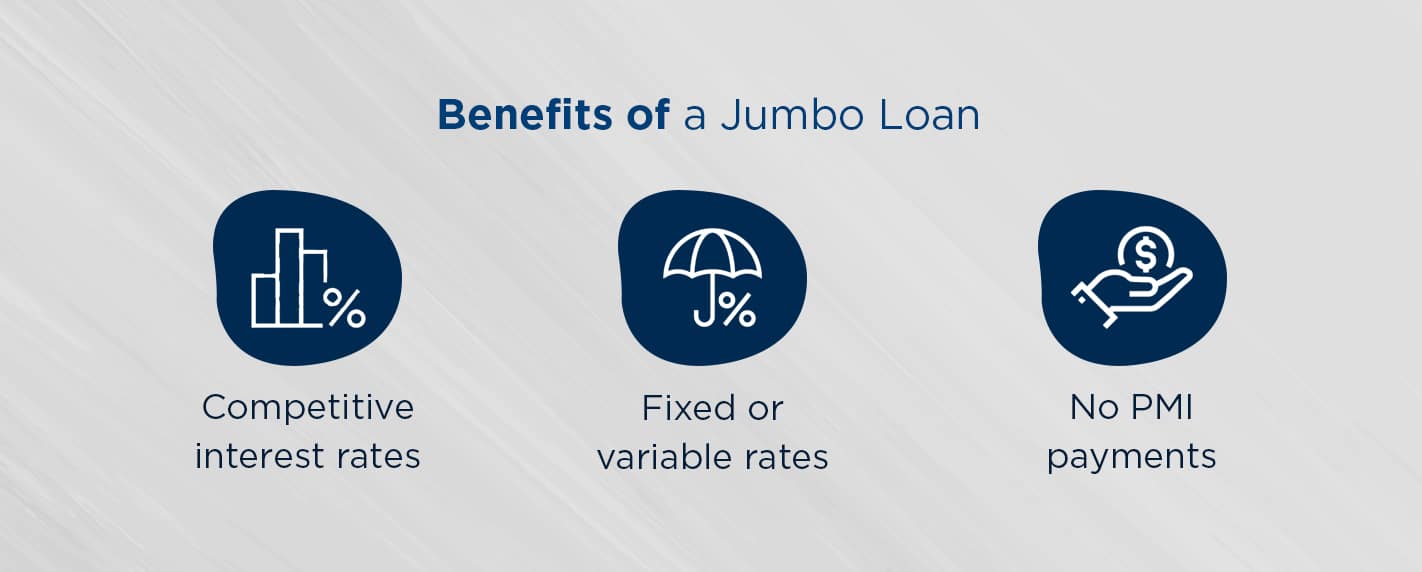Jumbo Loan: Tailored Mortgage Solutions for High-Income Consumers
Jumbo Loan: Tailored Mortgage Solutions for High-Income Consumers
Blog Article
The Effect of Jumbo Fundings on Your Funding Options: What You Required to Know Prior To Applying
Jumbo lendings can play a crucial duty in forming your funding alternatives, especially when it comes to getting high-value properties. Recognizing the balance between the advantages and challenges presented by these financings is vital for prospective customers.
Recognizing Jumbo Financings
Understanding Jumbo Loans calls for a clear grasp of their distinct features and requirements. Big car loans are a kind of mortgage that surpasses the conforming financing limits established by the Federal Housing Money Company (FHFA) These restrictions vary by place yet commonly cap at $647,200 in a lot of areas, making jumbo lendings important for funding higher-priced homes.
One of the specifying functions of big car loans is that they are not eligible for acquisition by Fannie Mae or Freddie Mac, which brings about more stringent underwriting guidelines. Debtors need to usually show a higher credit rating, usually over 700, and offer substantial documentation of revenue and possessions. In addition, lending institutions might require a bigger deposit-- often 20% or more-- to minimize threat.
Rate of interest on jumbo financings can be somewhat greater than those for conforming fundings due to the boosted risk thought by the loan provider. However, the absence of private mortgage insurance policy (PMI) can counter several of these expenses. Comprehending these factors is critical for prospective borrowers, as they substantially influence the terms and usefulness of safeguarding a big lending in today's competitive property market.
Advantages of Jumbo Lendings
Jumbo fundings supply distinctive benefits for property buyers seeking to acquire high-value residential properties that exceed conventional funding limitations. One of the key advantages of big lendings is their capability to fund larger quantities, allowing customers to acquire homes in premium markets without the restrictions imposed by adhering financing limits - jumbo loan. This versatility allows homebuyers to view a broader variety of residential or commercial properties that may much better fit their preferences and needs
In addition, jumbo loans commonly come with affordable interest rates, specifically for borrowers with strong credit history accounts. This can result in significant savings over the life of the finance, making homeownership much more budget friendly over time. Jumbo loans can be tailored to suit private monetary scenarios, using numerous terms and amortization choices that line up with the borrower's goals.

Challenges of Jumbo Lendings
Navigating the intricacies of jumbo loans provides a number of challenges that potential debtors need to be aware of prior to proceeding. One useful site significant hurdle is the rigid borrowing requirements enforced by economic institutions. Unlike conforming car loans, big car loans are not backed by government-sponsored enterprises, leading lending institutions to take on more strenuous standards. This often consists of higher credit rating needs and considerable paperwork to verify revenue and properties (jumbo loan).
Furthermore, jumbo finances commonly include higher rate of interest rates contrasted to traditional loans. This elevated price can significantly influence regular monthly payments and total price, making it necessary for borrowers to thoroughly analyze their financial situation. Additionally, the down repayment demands for jumbo finances can be substantial, usually ranging from 10% to 20% or even more, which can be an obstacle for numerous prospective homeowners.
An additional obstacle exists in the minimal schedule of big finance products, as not all lenders supply them. This can bring about a decreased swimming pool of choices, making it vital for customers to conduct detailed research study and possibly seek specialized lenders. In general, comprehending these challenges is crucial for anyone thinking about a big loan, as it makes certain informed decision-making and far better monetary preparation.
Certification Criteria
For those thinking about a big finance, fulfilling the certification requirements is an essential action in the application procedure. Unlike conventional finances, jumbo finances browse around these guys are not backed by federal government agencies, leading to more stringent needs.
First of all, a strong credit history score is vital; most lending institutions need a minimal score of 700. In addition, borrowers are usually anticipated to demonstrate a considerable income to guarantee they can conveniently take care of higher regular monthly payments.
Deposit requirements for big finances are also considerable. Borrowers must prepare for putting down at the very least 20% of the residential property's acquisition price, although some lending institutions might provide alternatives as reduced as 10%. Additionally, showing cash money reserves is crucial; lenders often require evidence of sufficient liquid possessions to cover numerous months' worth of home mortgage payments.
Contrasting Funding Choices
When evaluating funding options for high-value residential properties, recognizing the differences between numerous loan types is vital. Big loans, which exceed adhering finance restrictions, normally come with stricter qualifications and higher rate of interest than conventional lendings. These lendings are not backed by government-sponsored enterprises, which enhances the lending institution's risk and can result in more rigorous underwriting standards.
On the other hand, traditional car loans use important site even more flexibility and are typically easier to acquire for consumers with solid debt accounts. They might include lower rates of interest and a bigger selection of choices, such as repaired or adjustable-rate home loans. In addition, government-backed financings, like FHA or VA lendings, provide chances for lower deposits and even more lax debt requirements, though they additionally enforce restrictions on the loan quantities.

Verdict
To conclude, big lendings present both possibilities and obstacles for potential buyers seeking funding for high-value homes. While these lendings enable larger amounts without the problem of personal mortgage insurance, they feature rigid qualification requirements and prospective disadvantages such as higher rate of interest. A detailed understanding of the challenges and advantages linked with big finances is necessary for making informed decisions that line up with lasting economic goals and objectives in the property market.

Report this page